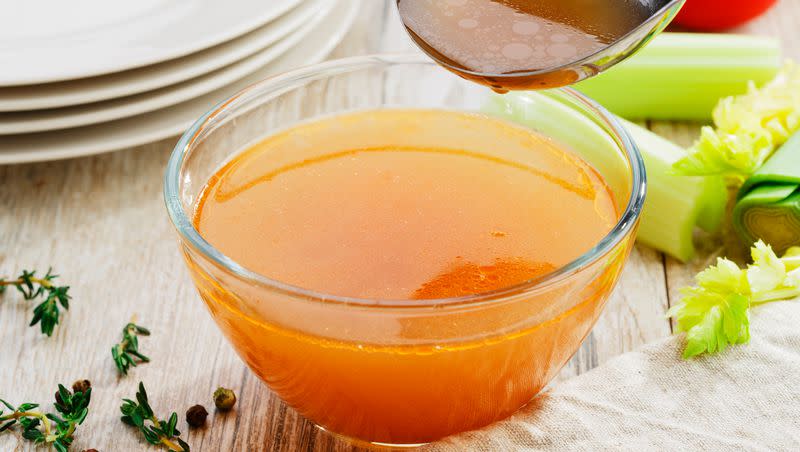Opinion: ‘Bone broth is not soup’ and other lessons learned from Gwyneth Paltrow’s diet

- Oops!Something went wrong.Please try again later.
“This is the first food I’ve eaten today.”
“I’ve only had lunch, I don’t eat breakfast.”
“I always forget to eat. I usually only have dinner.”
“Well I ate all three meals today, and I feel great.”
I listened to this conversation between four women once at a party at 8:30 p.m. And I was immediately in awe of the fourth woman’s response to the awkwardly competitive comments of the other three. It shouldn’t be so intimidating to admit that you eat a normal amount of food.
But Gwyneth Paltrow’s recent description of her restrictive “wellness routine” on the Art of Being Well podcast perpetuates the narrative that food restriction is healthy. It sounded alarm bells for many dietitians who are worried that her example will fuel the competition to eat less among American women stuck in diet culture.
Related
Brenna O’Malley, a registered dietitian, posted a video on her Instagram account, The Wellful, responding to Paltrow’s diet. “I’m going to encourage anyone who watched this video and thought ‘maybe I should do something similar’ to not just have coffee for breakfast and bone broth for lunch — bone broth is not soup — and a high vegetable dinner. Because that’s not enough food. At all. For any human.”
She adds, “How is this a wellness routine? It’s just not eating.”
Paltrow’s food restriction is promoting a problematic idea that health means rigidity, discipline and an intolerance for bodily needs and cues. Bodies are not meant to eat the same limited foods every day, contrary to what trending diets will tell you. When we don’t get enough variety, it can lead to malnutrition — regardless of the quantity.
The problem with uniform diets is that each of our bodies has distinctly different caloric needs — and those needs vary from day to day for each individual. Our genetic makeup, level of movement, and even menstrual cycle can affect how much energy our bodies need each day. Trying to eat what someone else eats and expecting to have the same physical outcomes does not work. And trying to eat the same restrictive diet day after day will not help your body reach its health outcomes.
An under-discussed but very important fact about food is that our bodies don’t absorb every bit of energy we consume. Take a 200 calorie ice cream cone; you may assume that everybody will absorb all 200 calories from that ice cream. You would be wrong.
Your body may absorb 100 of those calories while someone else’s body may absorb 150 or 80. This is due to a complicated mixture of variables: our metabolisms run at different speeds, our intestinal tracts are different lengths, our bodies can’t break down certain things like fiber, our bodies can absorb some foods faster than others, some bodies may have medical conditions like malabsorption that interfere with food absorption, and so on.
Related
Perspective: A world where a body doesn’t need to be changed
Opinion: The health goal you need for the new year is not what you think
This is why calorie counting and other forms of food monitoring and restriction are not accurate measures for the amount of energy our bodies are actually receiving. Instead, the only way to really know how much energy we need is by listening to our bodies’ hunger and fullness cues. Our bodies know how much energy we absorb and what our current needs are.
If we really want to promote wellness and care for our bodies, we should eat enough food, rest, exercise in enjoyable ways and tune out of conversations that try to conflate a harsh diet with wellness. Health is not rigidity — it’s flexibility, compassion and most importantly, joy. If you feel like you’ve lost the joy of living in the stress of dieting, there are teams of dietitians, therapists and anti-dieters ready to help you get it back. Eating all three meals a day is not a failure but a health success.
So please don’t tell yourself that bone broth a) is a soup and b) is a fulfilling daily meal. That’s no way to live. And it’s no way to treat a body that fights for you every day and needs energy to continue doing so. Your body deserves to be fed, and you deserve to partake in the rich human culture of food love, from pad thai to cream-filled donuts, and everything in between.

